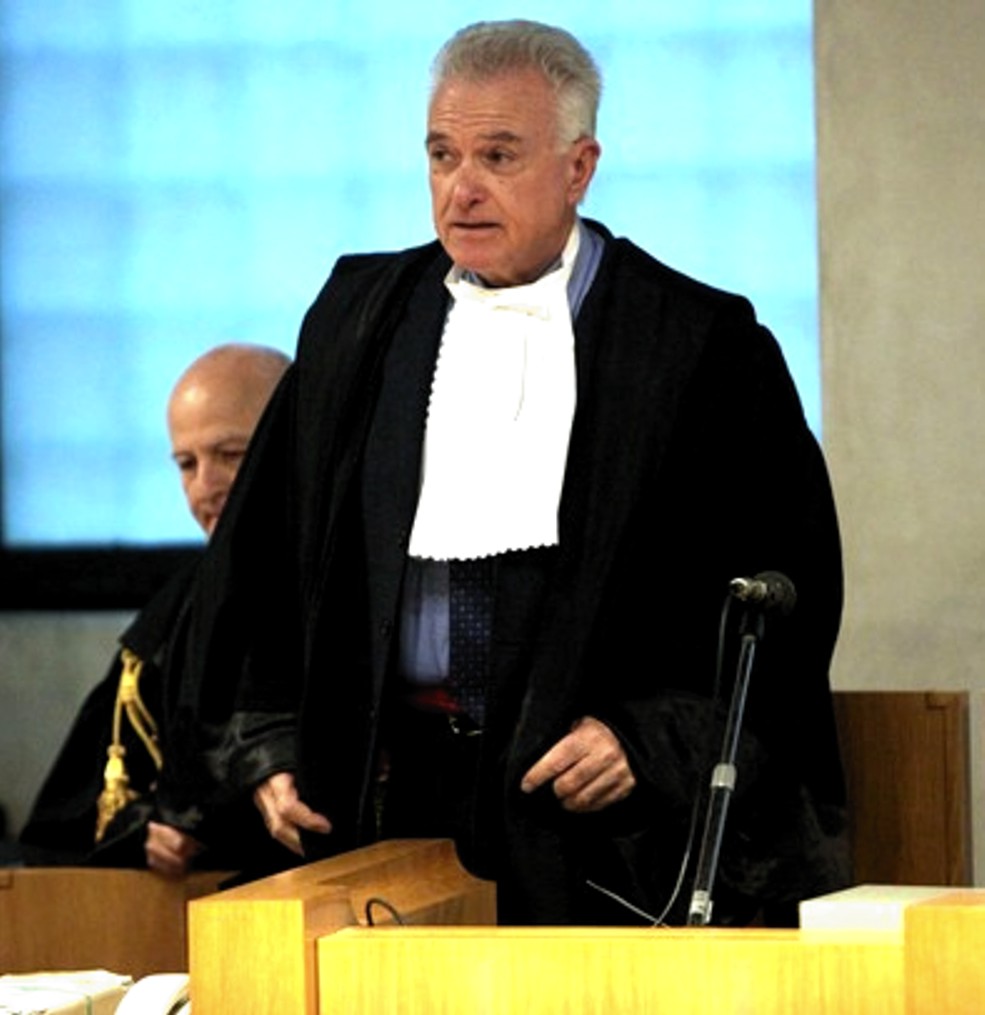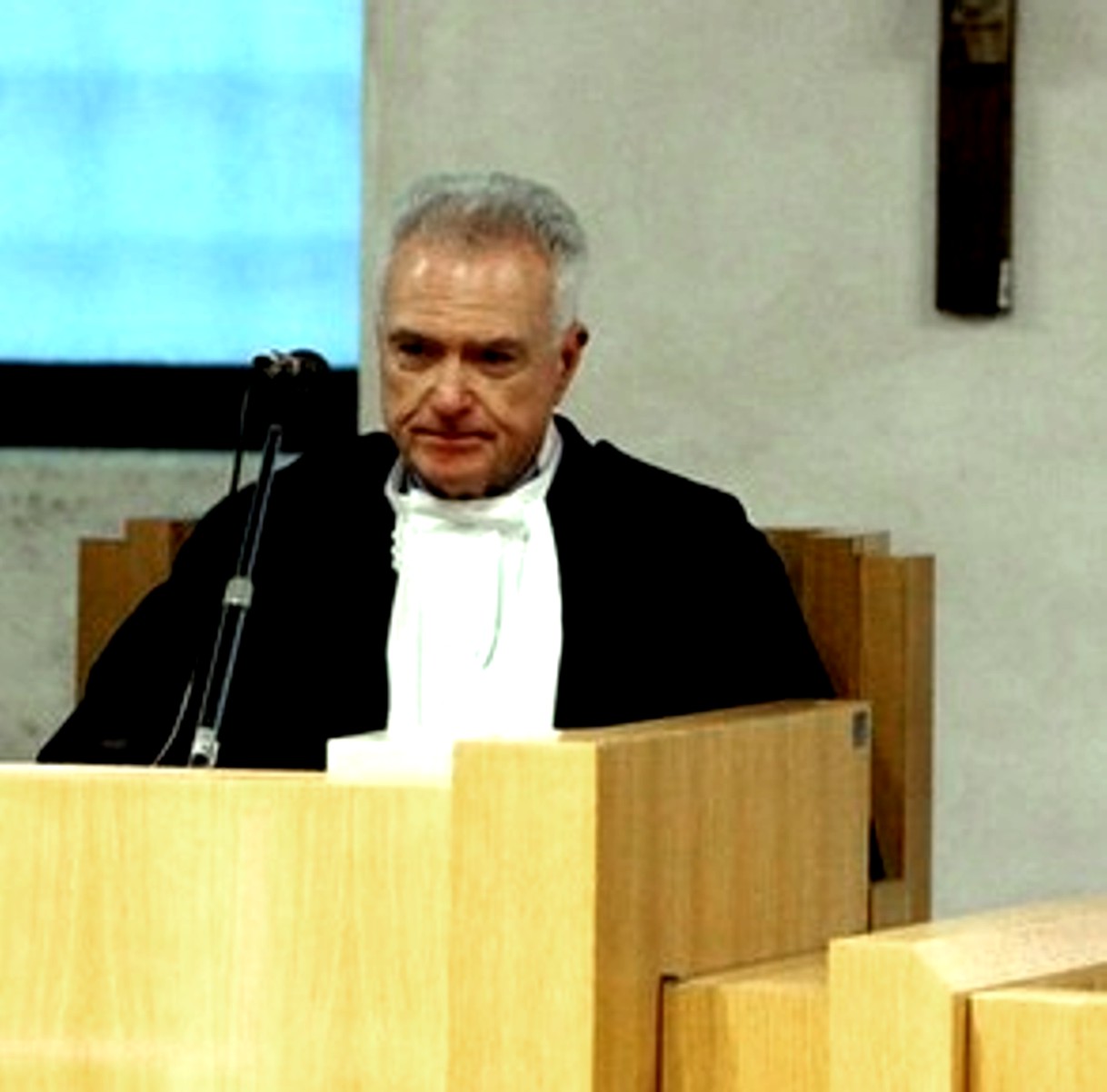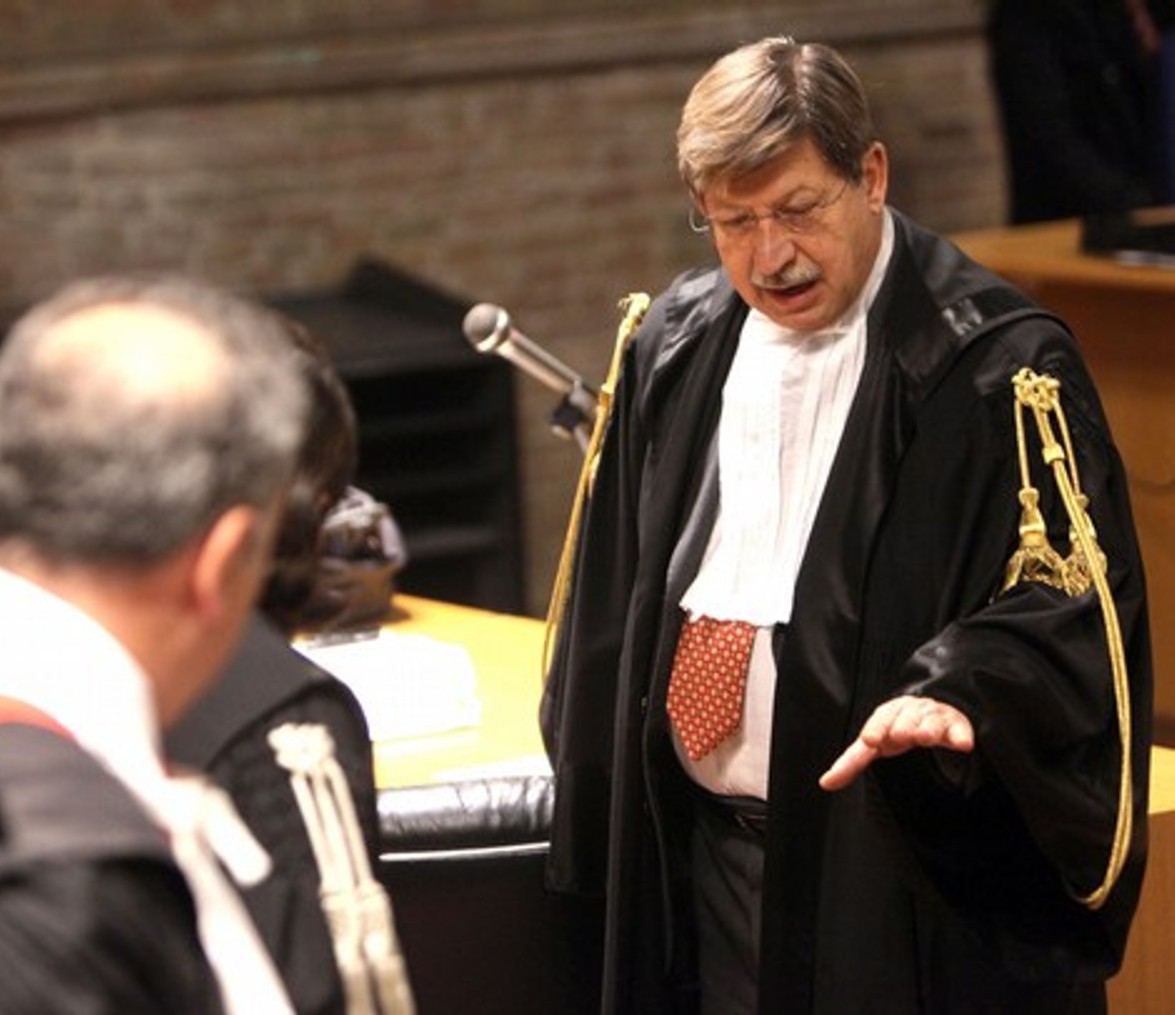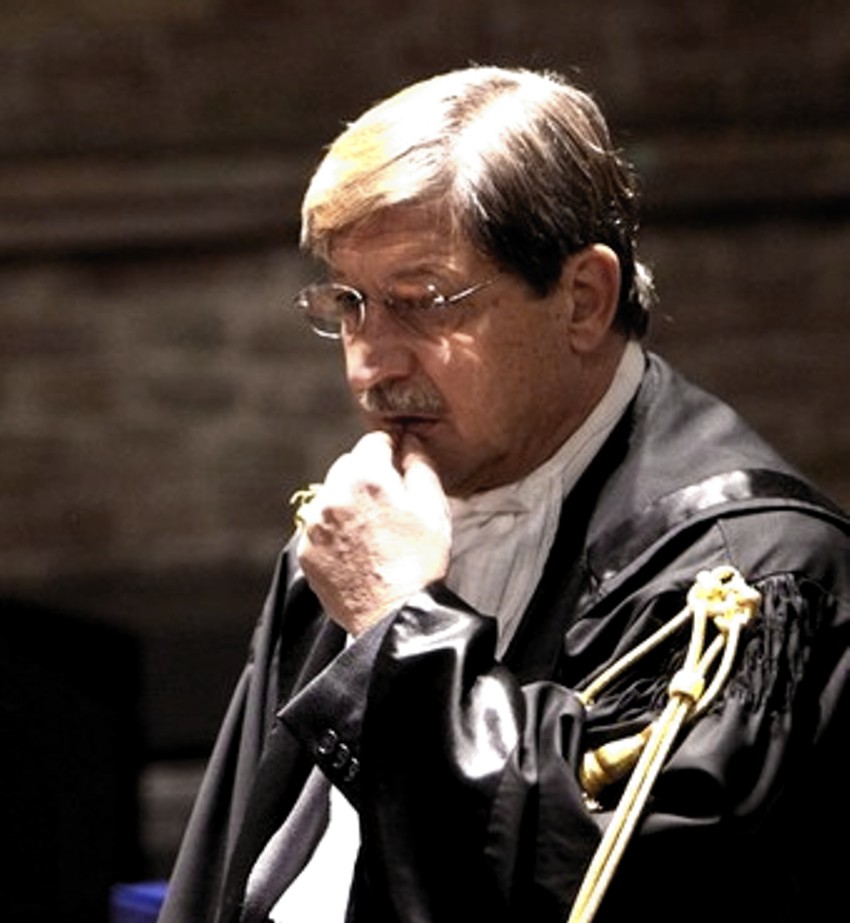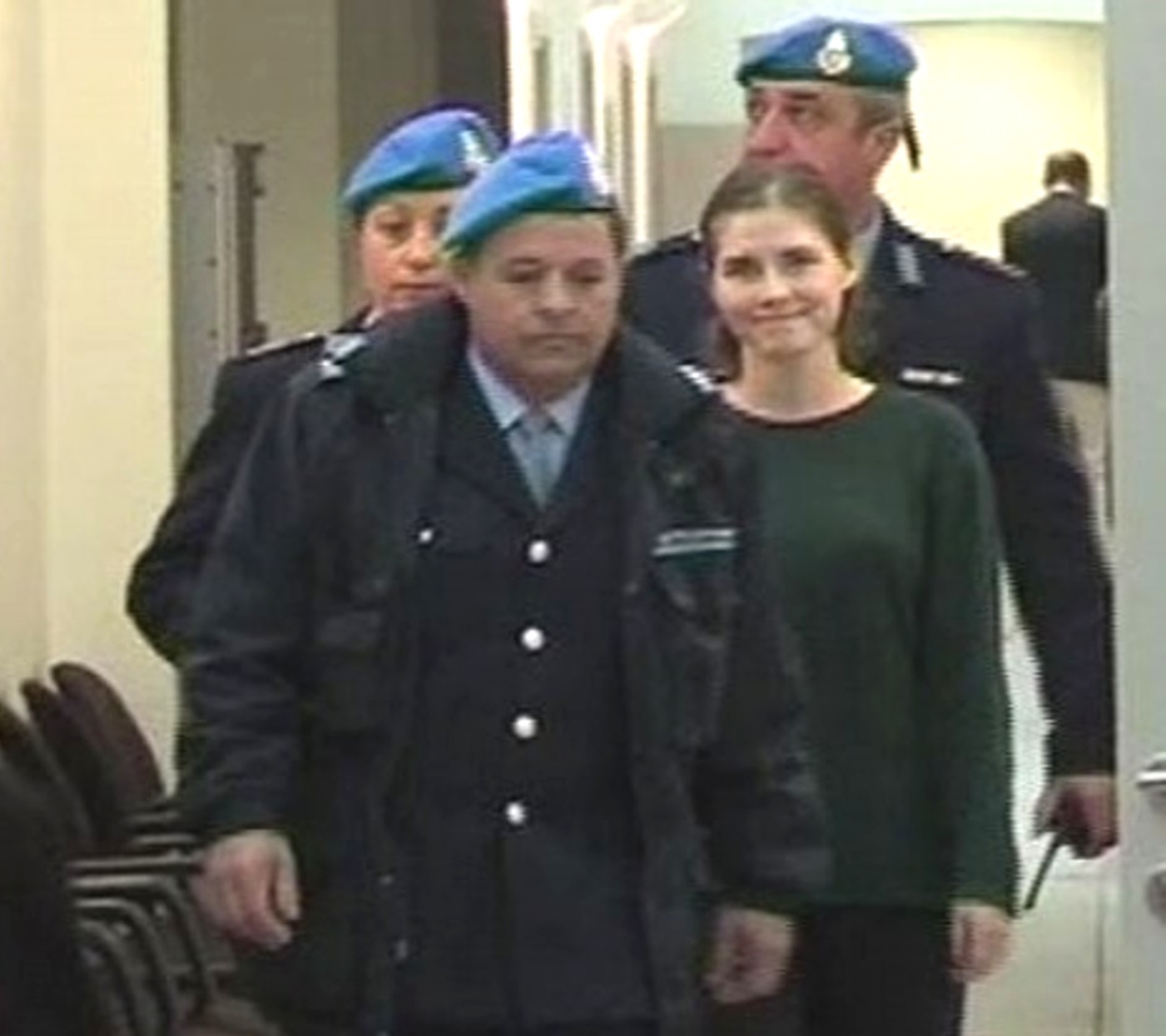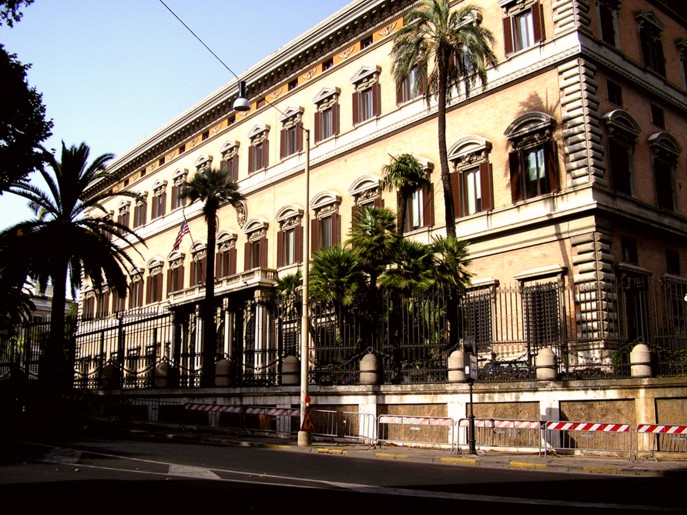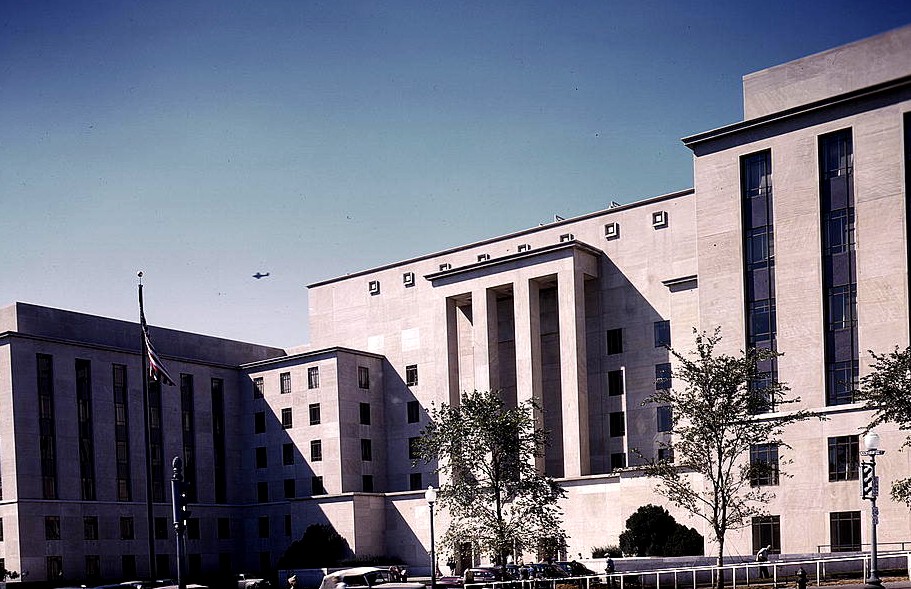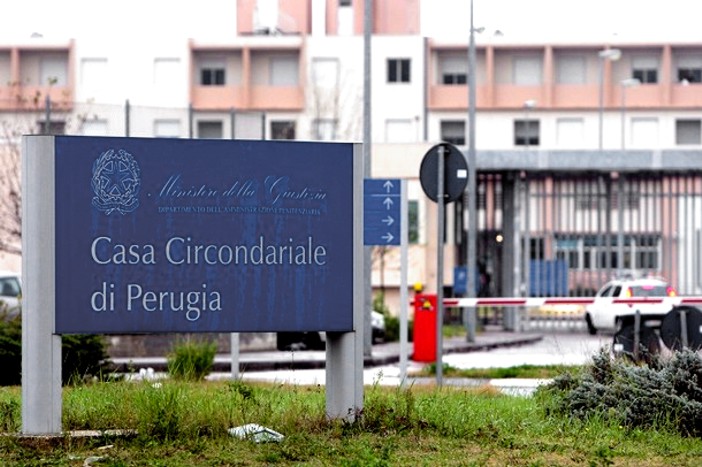
Political & economic headsup: US is demonstrating unsorted systems problems in spades. Do watch your investments. As Washington DC policy gets more & more off-target, big New York investors are betting very heavily that stocks will soon crash. Gross systems mismanagement 2017-20 tanked stocks several times.
Category: Appeals 2009-2015
Wednesday, November 24, 2010
1st Appeal Session: Judge Claudio Pratillo Hellmann And Prosecutor Giancarlo Costagliola
Posted by Peter Quennell
Monday, November 08, 2010
Another In Seeming Never-Ending Disasters For Hapless Knox Campaign
Posted by Peter Quennell
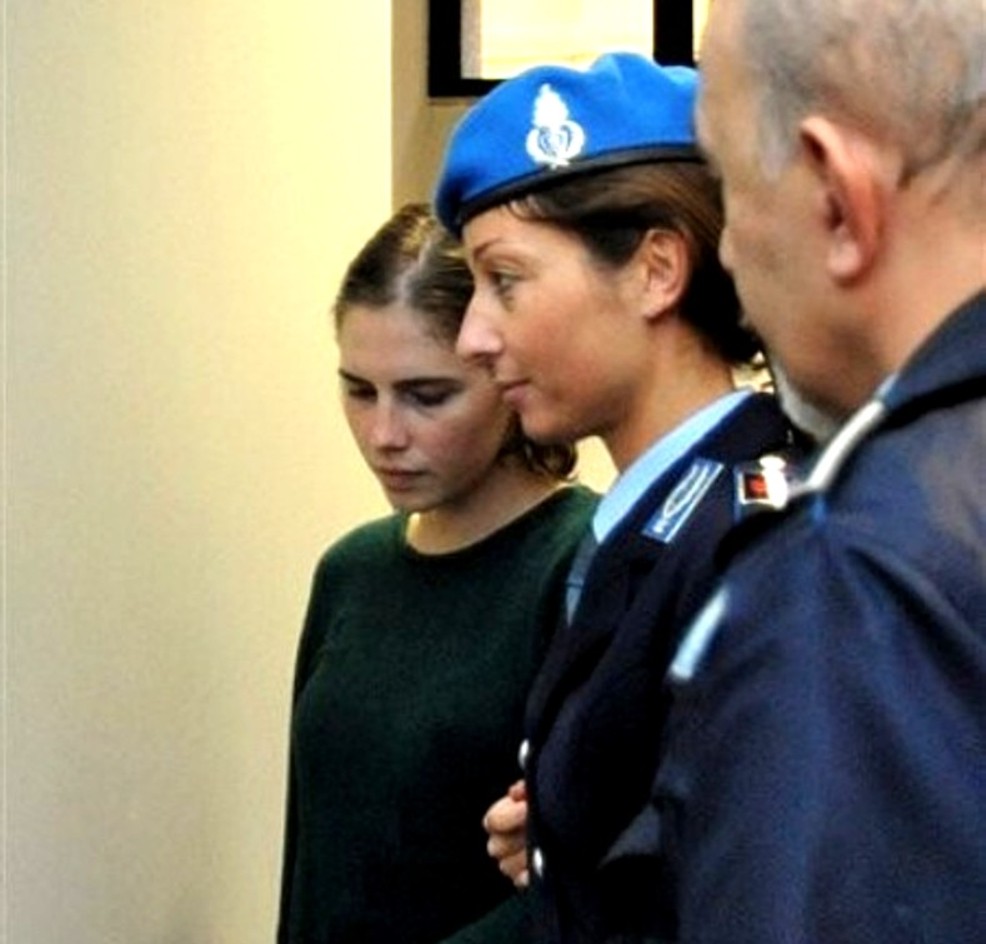
Apparently xenophobia and sliming and serial misconstruing of the evidence isnt working. The Italian authorities continue to be relentless and unblinking.
In court today, Amanda Knox was indicted by the judge and she WILL stand full trial next May for calunnia. This first report on the BBC News website as follows.
American student Amanda Knox is to face trial for slander after saying police beat her during questioning over the killing of Briton Meredith Kercher.
A judge made the decision at a closed indictment hearing in Perugia, Italy.
Knox, 23, told the judge she never intended slander and was just trying to defend herself, her lawyer said.
Ann Wise of ABC News adds this.
American student Amanda Knox was indicted for a second time by an Italian court today, this time for allegedly slandering Italian police for saying they were abusive when they interrogated her for the murder of her roommate.
Knox, who was convicted last year of murdering Meredith Kercher and sentenced to 26 years in prison, stood up in court and made what Italian legal officials call a “spontaneous statement” before the judge’s ruling.
“I have always tried to defend myself. I never wanted to offend or slander anyone,” Knox said in Italian.
Nevertheless, preliminary hearing Judge Claudia Matteini indicted Knox, 23, for slander.
The charge refers to Knox’s testimony during her murder trial that Italian police were rough with her when they interrogated her overnight just days after Kercher’s body was found in a pool of blood in the house they shared.
She claimed the officers yelled at her, discouraged her from calling a lawyer and cuffed the back of her head. The 12 officers named in the slander complaint have denied being abusive to Knox.
At the end of the long interrogation, Knox signed a statement in which she said she had a confused dream-like recollection of being in the house and hearing Kercher scream, effectively placing her on the scene of the crime.
Knox’s lawyer Carlo Dalla Vedova said Knox was “saddened” by the decision.
Another lawyer for Knox, Maria Del Grosso, told reporters that “for Amanda this (interrogation) was the genesis for her homicide accusation. She is very frustrated and obviously disappointed, but she knows that today’s was only a preliminary hearing and the truth was not ascertained today. Let’s hope it is when the case is debated because there was something that went wrong that night.”
Knox was driven into the courthouse in a police van with darkened windows. The hearing was closed to the public, but photographers were able to get a glimpse of her in the courtroom hallways. Looking thinner and drawn, Knox wore a dark green sweater and black pants, her hair is a jaw-length bob.
Before the hearing, Knox’s stepfather Chris Mellas told ABC News that “Amanda is doing better. She is rightfully angry about the slander accusations, and told me she was going to speak out in court this morning. She told me she wanted to tell them that she sees police interrogations shown on TV all the time, and would like to know why her interrogation was not recorded or videotaped.”
But according to her lawyers, she limited her statement to saying she was just defending herself and did not want to offend.
Knox will go to trial for slander on May 17, 2011 before a single judge, Cecilia Bellucci. Matteini said the case needed to go to trial to resolve some formal technical matters, and to debate the accusations, possibly with witnesses.
The lawyer for eight of the police officers, Francesco Maresca, said that the “framework of the request for an indictment was confirmed, and now we await the debate.”
Conviction of the charge could add as much as six years to Knox’s prison sentence.
Again, this is the nexus of Amanda Knox’s accusation against poor Patrick Lumumba who spent two terrifying weeks in Capanne Prison and later lost his business when the customers fled.
Whatever else she may be, Knox does seem to be a serial blamer of others. Blaming the cops for her blaming Patrick, Knox seemed to us to think, was an easy way out.
Italian reports say that she seemed to be scowling or sour or very serious or depressed (no mention of nervousness) and that she had put on a few pounds.
Sunday, October 31, 2010
Corruption Of Appeal: Angry Top Criminal Judge Chiari Is Blatantly Forced Aside
Posted by Peter Quennell

Umbria’s top criminal judge Sergio Matteini Chiari
Very Dirty Business
Only one month ago Umbria’s top criminal judge Sergio Matteini Chiari was to preside.
Now a very angry Judge Chiari has been forced aside with no public explanation from Chief Judge De Nunzio [image below] as to why.
A wildly wrongly qualified judge, Hellmann, a business judge with just two criminal trials in his past, both fiascos, mysteriously takes his place.
Rumors of foul play are appearing in the Italian media. Has Chief Judge De Nunzio been leaned upon politically? Do big bucks or rogue masons have any role in this?
Please click here for more
Friday, October 01, 2010
1 October 2010: Seattle PI’s Italy Based Reporter Andrea Vogt On Where Everything Stands
Posted by Peter Quennell

Former crack prosecutor Judge Chiari who once took an ex-Prime Minister down
Overview Of This Post
Another of those very useful roundup reports from Andrea Vogt, which contains some new points of real interest.
1) On Judge Sergio Matteini Chiari
When Bongiorno steps into the appellate courtroom to defend Sollecito, the judge will look familiar. Respected magistrate Sergio Matteini Chiari represented the prosecution during the controversial Andreotti appeals trial a decade ago in Perugia over the mafia murder of journalist Mino Pecorelli. Biscotti also defended a Cosa Nostra mafioso in that case.
Biscotti and Nicodemo Gentile, who represented Guede, have picked up a number of other high-profile Italian cases while awaiting Guede’s supreme court trial, scheduled for Dec. 16. The duo also represent the family of a murdered transvestite embroiled in a political scandal, as well as the family of a young girl gone missing from Taranto in August.
2) On the RS & AK appeal
The Knox and Sollecito appeal is scheduled to commence late in November.
Knox’s attorneys are soon expected to file “motivi aggiunti” or “additional motives” for appeal. That can include new evidence or witnesses defense attorneys think should be considered. The lead prosecutor—a substitute sitting in while a while a permanent replacement for the position is considered—will be joined by the two public ministers who originally prosecuted Knox and Sollecito; Giuliano Mignini and Manuela Comodi.
“We did not request to be involved,” said Mignini, reached by seattlepi.com this week. “In fact we thought we had wrapped up our duties with the conviction in the first trial. But when we were asked, we gave our availability.”
The appeals trial process will differ in many ways from the first trial. Only the makeup of the court—six lay jurors and two professional judges—remains the same. It will likely proceed much faster because the court is mostly debating Judge Massei’s judgment, not rehearing witnesses or re-examining evidence, though the court can specifically request to rehear key witnesses and the Knox and Sollecito defense teams have filed requests for an independent evaluation of certain pieces of contested evidence.
3) On possible outcomes from the appeal
On appeal, the case is once again wide open, as the court could do anything from giving Knox a harsher life-in-prison sentence to turning over her conviction.
“The court can review all the same evidence presented in the first trial, but simply decide that there is reasonable doubt, that they don’t believe it,” explained University of Parma criminal procedure professor Stefano Maffei.
The court also can agree with prosecutors, who are also appealing the 26-year-sentence and asking for life, and give her even more prison time. Or, the court can agree with the murder conviction, but find that mitigating factors outweigh the aggravated ones, which leads to a one-third reduction in sentence.
That is a most likely scenario, court observers such as Maffei say, especially since more than 18 Italian magistrates have reviewed the evidence in the Knox case and come to the same conclusion of culpability, which somehow ingrains the decision into the judiciary. For reasons that are sociological rather than legal—such as good behavior, political pressure, changed public opinion or prison crowding—sentences in Italy are often reduced on appeal.
“The tradition in this country remains that the court of appeal is usually more lenient than the court of first instance,” Maffei said.
4) On Amanda Knox’s slander trial
Knox will leave the prison for the first time in months [today] Friday. She’ll be shuttled in a police van into a protected side entrance to the courtroom, far from the media, which won’t be allowed into the closed-door hearing where “mostly technical” issues will be discussed.
She is charged with slander for accusing the Perugia police of hitting her as she was being interrogated the night before her arrest. During the course of the questioning, police became suspicious and turned up the heat over the course of several hours. Knox testified that they called her a liar and cuffed her on the back of the head twice while urging her to tell the truth. Multiple police officers and two interpreters who were in and out during the questioning deny such abuse took place and tell their own gentler version of how the night unfolded.
Unless one side produces audio or video of the questioning—which police and prosecutors have said does not exist because Knox was just a witness, not a suspect, when questioning began—it is likely to remain her word against theirs.
The presiding judge Friday (Claudia Matteini, the same judge who signed Knox’s original arrest warrant in 2007) could decide to hold an abbreviated trial, where everything is done behind closed doors and only documentary evidence is presented. She could decide there is enough evidence to move forward with a trial (or not). She could also simply choose to archive the case without passing judgment on its merit. Francesco Maresca, who represented the victim’s family during the Knox trial, represents the police in the case.
Here is our own take from trial reporting and the Massei Sentencing Report on what actually happened in the witness interview that night. Amanda Knox was thrown by Sollecito cutting her loose. (He has never since provided her cover.) But she did not confess - far from it. She fingered Patrick Lumumba. And as a suspect, she always had a lawyer present in subsequent interrogations.
More in the report too, on the movies, the books, and what it is really like to be serving one’s time It sounds punishing.
Friday, June 25, 2010
Amanda Knox’s Supporters Obtain Rome Embassy Cables About Knox, Prove Of No Help
Posted by True North
The American Embassy in Rome above, and the State Department in Washington below.
Ninety-nine percent of the reason why countries put embassies in other countries is because they really want to get along.
The US and Italy in fact do get along, extremely well, and there are thousands of transactions between the two countries every day. Thousands of Americans live in Italy, and millions of Americans are of Italian descent.
At the request of the US Administration, the Italian government recently put a large contingent of Italian troops in Afghanistan.
Under the US Freedom of Information Act, any American citizen can request and usually obtain astonishing amounts of official documentation, far beyond what can usually be extracted from the bureaucracies in most other countries.
Occasionally this information has embarrassed the department concerned, or the party in power in the Congress or the White House. But usually the documents are innocuous and without drama. Conspiracies simply never show up.
The blogger History Punk on his website Historiographic Anarchy has posted some cables (pdf format) from Rome to Washington, which report periodically on the Rome Embassy’s monitoring of Amanda Knox in Capanne Prison and her trial and appeals in Perugia.
As we would expect, these cables are extremely mundane. They were sent by a middle-level official in the consular section of the Rome Embassy to the Italy desk in the State Department.
They report carefully on the careful Italian legal process, and they never remark on anything wrong. No charges or claims or complaints are relayed from Amanda Knox. There is no talk of any anti-Americanism. No instructions, questions or comments are cabled from Washington in return.
One cable was not released. It was marked confidential and the contents are unknown. Here’s a guess at its contents: “Please keep those xenophobic ranters on a chain - they are doing the American cause in Italy no good at all”.
My first post here on TJMK and proud of it. This is a good fight I join.
Tuesday, June 22, 2010
The Aviello Story Seems To Show The RS & AK Defenses All But Concede Guilt Of All 3
Posted by Peter Quennell
Defenses Grasping At Straws?
The Sollecito defense latched with alacrity onto baby-killer and jailhouse-snitch Mario Alessi three months ago.
This seemed to have been widely taken in Italy as a sign of the Sollecito defense’s desperate weakness, rather than as a get-out-of-jail-free trump-card for RS.
Several weeks ago, the Amanda Knox defense latched onto Camorra clan-member and jailhouse snitch Luciano Aviello.
With a lot less alacrity though - his various stories have been around for a long time. This seemed to have been widely taken in Italy as a sign of the Knox defense’s desperate weakness,
Luciano Aviello, who is now in prison, and his brother Antonio, now on the run, are or were connected to the Camorra (NBC Dateline report above) which is Naples’s equivalent of the Cosa Nostra in Sicily and the NDrangheta in Calabria. The Camorra was in some ways the older, larger and badder of the several mafia arms.
Luciano Aviello and Antonio Aviello were living in Perugia at the time the crime against Meredith took place. Over a year ago, our poster Catnip posted this translation of a report from Italy on the Perugia Murder File board.
Saturday 09 May 2009
Prisoner writes: ‘I know real murderer’s name’
“I know the real name of Meredith’s killer, a fellow-brother Albanian friend of mine told me, and it’s not Raffaele Sollecito.” Luciano Aviello is Raffaele Sollecito’s ex-cellmate and, now, maybe encumbering his admirer, is writing another letter to Court of Assize president Giancarlo Massei.
A few weeks ago he had sent a letter in which he claims to have asked two of his friends to break into the murder house to prove that anybody could have done so. Yesterday, the page count of his letter jumped to five, and the tone was angrier.
He’s had it with journalists, because they’ve referred to his less than clear past, and because they wrote about his previous never-proven-true “revelations” on various important and dramatic criminal cases (like the disappearance of little Angela Celentano).
He’s had it with the police too, in whom he confided his secret about Raffaele’s innocence and who didn’t even give him the time of day.
He maintains that, actually, he has a letter written by an Albanian friend, which contains the real name of the murderer, and he wants to speak only to the court president, Giancarlo Massei, to reveal it to him.
Even the lawyer on the civil side of the case, Francesco Maresca, acting for the Kerchers, remains skeptical: “That letter ought to be re-read carefully: it’s not flour from his grainsack*”.
*****************
* This is a proverbial phrase (non è farina del suo sacco = “it’s not grist from his own mill”) meaning it wasn’t written off his own bat, and that other hands contributed to it.
And there is a video of a Sky News Italy report in Italian dated 21 April 2009 which in effect says “this isn’t any big deal’.
Judge Massei showed no interest in him. So Aviello and his kaleidoscopic claims thereupon went onto the back burner.
Fast-forward to several weeks ago, when the Knox defense engages in a high-profile, noisy flurry of activity to get a deposition from Luciano Aviello.
This time, Luciano recalls, it was actually his own missing brother who did it, and he himself buried some clothing, a knife, and some keys.
Casting total doubt on everything Luciano Aviello ever says, his hometown newspaper Il Mattino in Naples comes out with this report. It is our translation.
The Meredith Case - A Mariano Clan Supergrass Pops Up
“Amanda Is Innocent”
By Gigi di Fiore
In the newsroom of the Mattino he seemed at ease. Luciano Aviello was [20 years ago] just over twenty years old, and had asked to recount his experience as a “streetwise youth in the Mariano Camorra clan”.
In an earlier time, a war was in full swing in the Spanish Quarter [of Naples] between the Mariano clan, the “picuozzo” [another name for this clan after the “picuozzo” or cord around a monk’s habit] and the Di Biase family, also known as the “faiano”.
The DDA (Direzione Distrettuale Antimafia or Distict Anti-Mafia Directorate) did not yet exist, but Federico Cafiero de Raho was already employed as prosecutor in the investigations into organized crime.
It was he who dealt with that bloody war. Twenty years later, Aviello had become a news-magazine character. Now in his own words, he claims to have a rolet in the Perugia trial for the Meredith Kercher case as a “decisive” witness.
On 19 April of last year, he addressed two little hand-written pages to the President of the Court of Assizes of Perugia, Giancarlo Massei. He declared himself ready to tell the truth, and revealed that he had twice given some friends of his the task of breaking the seals on the house where the crime took place.
On 31 March of this year, Amanda Knox’s defense team video-recorded the declarations made by Aviello, who is now 41 years old. As the weekly news-magazine “Oggi” writes, he said: “It was my brother who murdered Amanda [sic]. I can recover for you the knife used in the crime and the keys of that house”.
This fellow arrived on the third floor of via Chiatamone [Editor’s office of the Mattino] wearing casual clothes with a pretence of elegance: he never retracts anything, always seeking to find suitable words to best describe his “revelations”.
Contact lenses, slim, a cousin killed because he was affiliated to the Mariano clan, Aviello spoke, revealing an outline personality, in a shadow world of braggadoccio, always on the sidelines of the dealings and violent acts of those in power among the clans of the Quarter at that time.
He ended up in jail, having confessed to a murder. It wasn’t true, but they had promised him 5 million lira, a lawyer and an annuity.
The clan didn’t respect the pact, and so he began to talk freely. Enticed by the good life, he began to act as a gofer/go-between selling “black lottery” tickets. He felt important. He earned 500 thousand lira per week.
It wasn’t bad. Then he did “embassies” [message-running], little services, but never great criminal leaps. The clans considered him “not very trustworthy”.
He was implicated in the investigation into the Spanish Quarter Camorra, and convicted.
Today, Federico Cafiero, now deputy prosecutor and DDA Coordinator for the investigations into the Caserta province clans, says of him: “He was altogether untrustworthy, although every so often he would invent a new one [new story]. A revelation, as he would call it, which would subsequently reveal itself to be out and out nonsense”.
Such as when he said that he knew where Angela Calentano was to be found, or that he knew the hideouts of the main fugitives of the D’Alessandro di Castellammare clan.
For his “revelations” against Tiziana Maiolo, ex president of the Justice Commission of the Chamber, he was hit with a trial, in 1997, for calumny.
Two years ago, he fired off his biggest tale yet: he accused a public prosecutor from Potenza in the famous trial on “dirty robes” between Catanzaro and Salerno. He was given an audience by the prosecutor Rosa Volpe in Salerno.
He had announced revelations. His contradictions were immediately exposed.
On those occasions also, the sources of his stories were newspaper articles or gossip with his cell-mates. Such as Raffaele Sollecito, or Gennaro Cappiello for the “dirty robes” investigation.
A compulsive liar, a seeker of publicity?
Twenty years ago, Aviello seemed to be a self-centred person, proud to present himself as a witness to “important facts”. But he never managed to arrive at a scheme of constant collaboration.
For various crimes, he has so far served 17 years in jail. Now the Perugia case appears. Who knows?
Our poster SomeAlibi seems to have had the last meaningful word on the absurdity of this tale. SomeAlibi posted this rather devastating satire on the PMF forum.
I can see it now..
Ghirga: “Well thank you Mr Luciano Aviello, that testimony I think the court will find extremely interesting concerning why Amanda Knox couldn’t have done the murder because it was your brother who was responsible. Despite the fact he’s missing. But thank you and I believe we’re finished.”
Luciano Aviello (quietly): “We ain’t finished”
G: “Uh?”
LA: “So, about this de-fa-may-shun thing.”
G: “Uh?”
LA: “She didn’t do it.”
G: “Sorry?”
LA: “She didn’t dooo it.”
G: “But Mr Aviello we brought you here to talk about the murder not the—”
LA: ”—see it sounds like you ain’t hearing me too good. Perhaps you need a little airation of your ears to help you with that. How would a 22 millimetre hole strike ya? She didn’t say nothing. She didn’t doooo it, capice?”
G: “But, she said it in interview. And in court. I mean, we were all there”
LA (putting tooth-pick on witness stand) “See, now you are making me repeat myself and I don’t like that at all, no I don’t. But I am a tolerant man, so maybe once more for luck ok? She didn’t dooooooooo it.”
G: “All of us were there!... She doesn’t actually disagree she said it…. hello… Mr Aviello… hello… what are you…. what are you doing… why are you counting?”
LA: “Now requiring this many pine boxes ain’t going to be ecologically acceptable my friend, so I suggest EVERYONE here learns to listen up real good ok?”
Court (all): “Huh?”
LA: “Repeat after me. She didn’t dooooooooooooooooo iiiit”
Court (all): “Like hell she didn’t”
LA: “Wise guys, huh?”
Well… that certainly went very well! This all reads like an Italian movie called in English Johnny Stecchino by Italy’s favorite funny actor Robertio Benignii
He accidentally finds himself confused with a mafiosos in Sicily, sees his days are very numbered, and starts talking fast. Very fast… He gets out of it, somehow, but the real mafioso still takes the hit.
Nice knowing you, Luciano…
Wednesday, April 07, 2010
The Transcript Of Today’s Online Chat Session With Barbie Nadeau Of The Daily Beast
Posted by Peter Quennell
Lucas Wittmann:
Hi, I’m the Books Editor at The Daily Beast and I’m delighted to welcome Barbie Latza Nadeau and our readers to discuss her new book, Angel Face…
BARBIE LATZA NADEAU:
I’m Barbie Latza Nadeau. Welcome.
[Comment From kcolorado: ]
how was your sense of who she is affected by seeing her in court everyday? Have you spoken with her directly?
BARBIE LATZA NADEAU:
Seeing Amanda Knox walk into the courtroom every day was very important in understanding how she interacted with her lawyers and her family, and in understanding how the jury perceived her. Amanda has not yet given any one-on-one interviews so no, I have not spoken to her directly.
Lucas Wittmann:
Just so you know we see your comments and will publish them live as Barbie is ready so please keep them coming…
[Comment From Kevad: ]
You have also stated in tv coverage that “we still do not really know what happened in that room”, is that how you still feel?
[Comment From stint: ]
Great job with book, Barbie. I really enjoyed it.
BARBIE LATZA NADEAU:
Yes, after over two years following this case, none of us know exactly what happened in Meredith’s bedroom that fateful night. No one has confessed to the crime, so until someone does, we will not have a clear understanding of the exact dynamic of the murder.
[Comment From Guest: ]
How do you think your journalism during the trial affected its outcome?
BARBIE LATZA NADEAU:
Thank you. I’m glad you liked the book. My hope is that it provides perspective of this complex case.
BARBIE LATZA NADEAU:
I don’t think that any of us who covered this trial as journalists had a direct impact on the jury’s decision. We were not in the deliberation room.
[Comment From Wade: ]
Why in your opinion did the seattle media frame the events as they did
BARBIE LATZA NADEAU:
I think that many of my colleagues in the Seattle market did the best job they could with the information they had. Their primary source was the Knox family, so their coverage was affected by that. When members of the Seattle press came to Perugia, they did not speak Italian and had a difficult time following the court sessions because there was no translator. Those of us who live and work here in Italy often helped the American press as best we could.
[Comment From stint: ]
Regarding earlier comment. Since Knox Family PR firm *very* closely controls any and all media contact with themselves, and they have reportedly blackballed any reporters even seen *near* you, do you really think you might interview Amanda in the future
BARBIE LATZA NADEAU:
I have hope that Amanda might want someone objective who understands Italian to conduct an interview with her at some point down the road. But because I have been skeptical, I am fairly sure I am not high on the list of interview candidates.
[Comment From mnh12121887:
But why did the American media take the Knox family version so much on face value without even trying to look deeper?
BARBIE LATZA NADEAU:
I think that the economic crisis has played a role. Many bureaus have been closed across Europe and it would have been a major expense to send a correspondent to Italy for such a long trial. I think that had there been a larger Italian based press corp it would have made a difference in coverage.
Lucas Wittmann:
Let’s explore now the facts of the case.
[Comment From Guest: ]
Do you believe Knox’s assertion that she was abused during her final interrogation?
BARBIE LATZA NADEAU:
I think it depends how you define “abused.” If you mean to ask if she was flicked on the back of the head (which is a cultural norm here in schools and in criminal investigations), then yes, that very likely happened. If you mean to ask if she was abused in the way the American police have been caught on CCTV abusing detainees, then no, I do not think she was abused.
[Comment From Guest: ]
You seem to have made some strange claims in your book - about AK and RS actually NOT remembering what happened. How on earth did you reach that conclusion?
BARBIE LATZA NADEAU:
I gave my hypothesis about the crime based on sitting through 11 months of a trial. I believe that if Amanda and Raf would have remembered exactly what happened, whether they were involved or not, their explanation of the evening of November 1 would have been more clear. A lie is often very black and white. Their confused responses seemed to me to be more consistent with a hazy memory or no memory at all.
[Comment From hattie: ]
I still believe that Amanda Knox is innocent, and I read your book to get another point of book. Thank you for that. My concern is that there is so much more DNA evidence against Rudy. How was Amanda able to clean up and not leave more DNA evidence in Meredith’s room?
Lucas Wittmann:
Don’t have Angel Face yet? Order it now as an e-book or paperback: http://bit.ly/chDjIX
BARBIE LATZA NADEAU:
I think it is important to remember that the same scientific police and laboratories tested the DNA for all three suspects. That is to say, if the DNA matches Rudy and is accepted, then the DNA that matches the other two should also be accepted. How she may have left so little DNA if she was actually in the room is very hard to square. Whether some of the 14 unidentified fingerprints belong to her is a big question in this case. There were very few fingerprints on any flat surfaces belonging to Rudy either. Is it possible to pick and choose how to clean up DNA? Maybe not, but it is possible to wipe up fingerprints and footprints that you know are your own.
[Comment From Guest: ]
If they didn’t remember then why did they do the clean up? They clearly knew they had ‘something’ to hide!
BARBIE LATZA NADEAU:
That is a very good question. Perhaps waking up in a house with a dead body makes one act irrationally. Perhaps because they might not have remembered what they did the night before, they panicked. We do not know, but that is one question I will ask Amanda if I ever get a chance.
[Comment From Guest: ]
After 11 months viewing the trial, do you believe that Amanda joined in any sort of sex game with Meredith? It seems that Amanda did, bt then went to her room BEFORE and DURING the murder.
BARBIE LATZA NADEAU:
There is no forensic evidence that Amanda had sexual relations with Meredith. I have a hard time accepting that it started as a sex game. I believe that if they were involved it was because they could not stop themselves from an aggravated escalation of violence. In essence, they could not tell agony from ecstasy and did not realize that Meredith needed their help. Instead, they may have helped Rudy and that is when things got out of control.
[Comment From Lisa: ]
I see that some folks her responded to the question “Who Killed Meredith Kercher” with “Amanda and Raffaele” only. No Rudy. How could that be? Do you think journalism had anything to do with that?
Lucas Wittmann:
We’re going to wrap this up in 10 minutes so please contribute any final questions now.
BARBIE LATZA NADEAU:
I think that the fact that Rudy’s trial was sewn up before Amanda and Raffaele’s began is the reason many people separate them in this crime. But Rudy was convicted for his role in the murder, not as a lone assailant. His judge’s reasoning clearly states that he felt Rudy acted in tandem with Amanda and Raffaele.
[Comment From mhm12121887: ]
What is happening now—in Italy?
[Comment From Noel: ]
How do you see the appeal going?
BARBIE LATZA NADEAU:
Right now lawyers for both Amanda and Raf are preparing their appeal briefs. Those will be filed within a few weeks and then the date will be set for the appeal hearing, likely in the fall.
[Comment From Kermit: ]
Hi Barbie. Your journalism has opened up transparency and debate from an Iron-Curtain situation of control in the American press. Where do you see each of the three convicted (pending appeal) murderers 10 and 20 years from now?
[Comment From stint: ]
Thanks so much for this opportunity, and again thanks for all your objective coverage in “Angel Face”.... great read.
BARBIE LATZA NADEAU:
I think that the appeal will result in a few years taken from the sentences of both Amanda and Raffaele.
[Comment From Guest: ]
hasn’t her real beauty complicated this hugely from day one?
[Comment From hattie: ]
Thank for an excellent book. I read it in one day, and it gave me a different side of the story. I hope that both pro- and anti-Amanda sides will take an opportunity to read this book.
BARBIE LATZA NADEAU:
I think that it is very likely that all three of the convicted murderers of Meredith Kercher will return home one day.
Lucas Wittmann:
Here is the link if you’d like to order the Angel Face e-book and paperback: http://bit.ly/chDjIX
[Comment From mhm12121887: ]
Thanks also for the book and for the “on the spot” reporting and objectivity
BARBIE LATZA NADEAU:
I think that Amanda’s beauty has increased the interest in this case, but I do not think that it dictated the outcome.
[Comment From Patty: ]
Thanks for answering questions Barbie.
Lucas Wittmann:
Down to our final question…
[Comment From somealibi: ]
(For the end) Compliments on the presentation and technology with the poll-type questions
[Comment From Patty: ]
Do you think any of them will ever confess?
[Comment From Guest: ]
You’ve been a real heroine in this case Barbie. Well done for your objective reporting.
Lucas Wittmann:
Thanks for answering the polls!
BARBIE LATZA NADEAU:
I think that one day we will have a confession, yes. But not while they are in prison.
Lucas Wittmann:
Wait…one more!
[Comment From Guest: ]
Can you give your reactions to the 2 op-ed pieces in the NYTimes (Seattle writere)?
[Comment From Guest Guest: ]
Can we have another session please????
Lucas Wittmann:
Re: another session. So many great comments and questions, we’ll keep it in mind.
BARBIE LATZA NADEAU:
I was in Perugia when those op-ed pieces came out and they were not helpful to Amanda. The prosecutor was angry, the jury members were insulted and Amanda’s own lawyers were not happy. Op-ed pieces are by nature controversial, but they should be weighed to see whether they will impact the topic. That sort of journalism likely had more impact on this case than what anyone wrote with a Perugia dateline.
Lucas Wittmann:
Thanks everyone for participating!
And thanks Barbie for answering all these great questions.
[Comment From ricardoricardo: ]
which ‘op-ed’ pieces > do you have a link ?
Lucas Wittmann:
Here is the link: http://opinionator.blogs.nytimes.com/2009/06/10/an-innocent-abroad/
[Comment From Guest: ]
Cheers Barbie! Will raise a glass to you tonight…
BARBIE LATZA NADEAU:
Thank you. I want to also thank Andrea Vogt, of the Seattle P-I who was a voice of reason in Seattle during the trial based in Italy. The op-ed pieces are by Timothy Egan.
[Comment From Guest:]
Thank you. This is nice technology and nice pace. Could have been twice as long 😊
[Comment From somealibi: ]
Keep it going Barbie - thanks - we value an objective take
Lucas Wittmann:
Thanks again to everyone and we’ll definitely keep this in mind the next time.
[Comment From ricardo: ]
many thanks…
[Comment From Patty: ]
Thank you, and Andrea, for your coverage of the trial. Invaluable.
BARBIE LATZA NADEAU:
Thanks to everyone who sent question.
[Comment From Clander: ]
Ciao from Roma !! You ROCK Barbie !
Sunday, December 20, 2009
Guede Appeal Outcome Mon-Tues Could be An Indicator To Knox-Sollecito Appeal Outcome
Posted by Peter Quennell
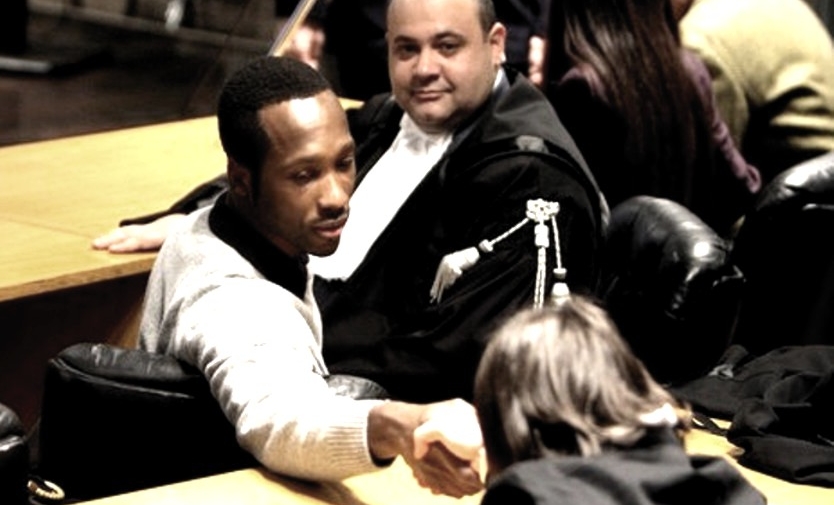
The first eight posts at the bottom here represent our previous reporting on Rudy Guede’s appeal.
Commissario Montalbano’s recent post on the Italian appeals process is also vital reading here.
The appeals grounds seemed thin, and the appeals judge will be very thoroughly acquainted with the report of the judge who first sentenced him, Judge Micheli.
There were only two variations to his original story in the appeal hearings: that he had not had intimate relations with Meredith, and that he had seen and identified Knox but not Sollecito. In his trial, his story was that he had identified Sollecito by appearance if not by name, and that he might have heard Knox nearby.
He emphasized that he briefly tried to save Meredith. But of course he fled without ever calling an ambulance, even anonymously, and Meredith was left clutching her wounded neck, with her door locked and her mobile phones removed. Guede then went out to a disco before taking to his heels to Milan and then Germany.
Recently Guede was mysteriously attacked in prison. Connected or not? Who knows? But Rudy might be thinking that 30 years in prison with time off for behavior is a better bet than another possible attack that ends worse.
The pro-Knox and Sollecito factions seem to be banking on their appeals late 2010 being a whole new trial. Guede’s appeals judge simply refused to reopen the whole case with new witnesses, and the November hearings were over very quickly.
Our Italian experts tell us that if Guede gets freedom, then Knox and Sollecito may expect to see freedom too. And if Guede gets his sentence reduced or confirmed, then that is very likely to be their fate too.
For why they all seem to be so joined at the hip read here and here. The Guede-as-lone-wolf theory never even got to first base.
Tuesday, December 15, 2009
Another Prominent US TV Commentator Sees The Evidence Pointing Pro-Guilt
Posted by Peter Quennell
Three highly influential women commentators in the US are now forcefully arguing pro-guilt on TV.
They are legal talk-show host Jeanine Pirro (video below), legal analyst Wendy Murphy, and now conservative political commentator Ann Coulter. All three proceed from a deep understanding of the hard evidence.
The bleach purchases mentioned here were never actually proven, though Knox was seen in the bleach area of the Conad supermarket early the day after (when she claimed to be asleep), and in both Knox’s and Sollecito’s apartments, bleach did appear to have been used.
Otherwise, pretty good.
By the way, Ann Coulter’s new book “Guilty” that you see promoted on the video is not about Amanda Knox. It is actually about liberals being too soft on defendants. To ourselves the large and rapidly growing community of those pro-justice-for-Meredith and pro the verdict and sentence seems to cross all political boundaries.
We’d say the common factors here are strong logic, hard work in really getting into the evidence (a lazy Peter Van Sant obviously hasn’t), a reluctance to be snowed, and a deep humanity toward the real victim.
Meredith. In case the FOA campaign ever forget.
Andrea Vogt Has A Long Cool Take In The Seattle PI On Where Things Stand
Posted by Peter Quennell
Please click above for the report. This one is highly worth reading in full.
Apart from the highlights quoted below, the report touches on Amanda Knox, now semi-resigned in her cell, on the very extensive nature of the evidence, and on the pro-defendant stance of the Italian justice system.
Italian reactions to the commentaries of Timothy Egan and others not very immersed in the evidence are also reported on.
According to Andrea Vogt, in many ways, things are not, at least not yet, so very different from before. The campaign goes on, if now sensibly a lot more subdued.
We do however continue to see large numbers coming by TJMK to read here at length (especially now from Seattle) and according to our emails the shock-factor of the actual evidence is often quite considerable.
And the judges’ long and very detailed judgment report out early next March at the latest may prove to be a definitive bottom line, as Judge Micheli’s report was after the Rudy Guede trial.
It is that objective and exhaustive judgment statement that will define what the appeal is about.
1) On Italian reactions to the charges of anti-Americanism
On Monday, another salvo was fired at Sen. Maria Cantwell, D-Wash., from Italy as the Italian president of the Italy-USA Foundation, an association that works closely with the U.S. Embassy in Rome, released a statement on the foundation’s website describing his Sunday prison visit with Knox and harshly criticizing Cantwell’s comments about the Italian justice system.
“I believe it is out of place to insert anti-Americanism, as stated by American Sen. Maria Cantwell, into a situation like this that can be easily exploited,” wrote Rocco Girlanda, president of the Italy-USA Foundation, in a news release posted on the foundation’s website. “In my opinion it would have been more correct to avoid creating controversy or alleged affairs of the state that are totally outside the official declarations of the parties and of their respective governments.”...
On Monday, Cantwell’s spokeswoman did not repeat the complaints that the senator has made but said her office will continue to monitor the Knox case….
Cantwell’s questioning the fairness of the Italian justice system has raised the ire of many on this side of the Atlantic….The handful of American journalists inside the courtroom regularly attending the trial did not witness the “anti-Americanism” of which Cantwell spoke.
2) What really mattered to the jury in their deliberations and the length of the sentence
Jurors said they believed the forensic evidence, as reported last spring here and here and not the defense’s attempts to dismiss the evidence at trial and during closing arguments.
The forensic evidence was presented in open court and subject to cross-examination and robust debate. Legal scholars say Knox is lucky she didn’t get a longer sentence….
The jurors, polled and interviewed after the verdict, said they were not split on the question of innocence or guilt but rather on the question of whether she should get life in prison or less.
3) An Italian expert on the justice system notes that this was a fair trial
“This is the simplest and fairest criminal trial one could possibly think of in terms of evidence,” said Stefano Maffei, lecturer in criminal procedure at the University of Parma.
“There were 19 judges who looked at the facts and evidence over the course of two years, faced with decisions on pre-trial detention, review of such detention, committal to trial, judgment on criminal responsibility. They all agreed, at all times, that the evidence was overwhelming.”
The court’s sentence of Knox and Sollecito was mild, Maffei said, with the jury taking into account the facts of the crime along with her clean criminal record.
He noted that a similar reduction in sentence did not happen with co-defendant Rudy Guede, even though he agreed to a fast-track trial, which reduced his sentence from life to 30 years.
4) The very extensive nature of the evidence presented.
Often lost in the debate over Knox’s guilt is the evidence presented at trial. Some of it was strongly disputed, and some likely forgotten by those in America trying to keep up on a trial that took place a couple of days a week over several months with long breaks of no proceeding at all.
Jurors, interviewed after the verdict, said they were convinced by the forensic evidence and were unanimous on the question of guilt or innocence, though they made a point of noting they did not believe Kercher’s murder was premeditated.
[In Andrea Vogt’s full report in the Seattle PI (click through above) there follows an excellent bullet-point list of the evidence.]
5) The many pro-defendant protections built into the Italian justice system
For historical and political reasons unique to Italy, the country has a justice system with an extraordinary number of protections for the accused, more than many other European nations.
“These criticisms we are hearing from the United States are so strange,” said Stefania Carnevale, an assistant professor of criminal procedural law and prisoner’s rights at the University of Ferrara.
“They leave me perplexed because the critique seems to be about the behavior of the police or the prosecutor or small details of this single trial, not the system as a whole. If there are errors in a trial, the Italian system has rigorous checks and balances in place to correct such mistakes, and guarantee an appeal.”
Knox may have a number of salient points on which to base her appeal, most notably several pieces of contested forensic evidence and the fact that she was questioned without an attorney present despite being treated as a suspect by Perugian police.
The presumption of innocence is so strong in Italy that under criminal procedural law, Knox is still not considered a convicted murderer, and won’t be, until she has been found guilty through all phases of the process: Court of Assize, where the jury just made a decision; the Appellate Court of Assize; and the Court of Cassation.

